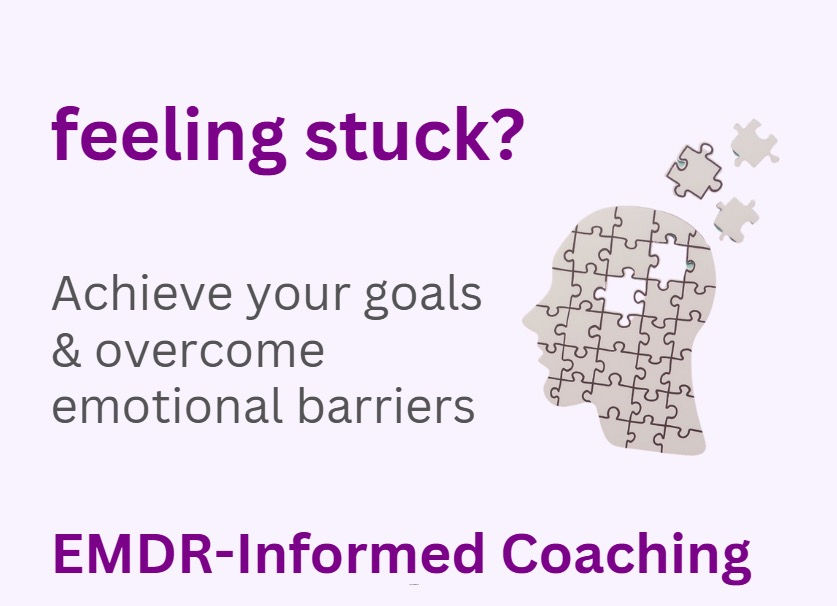

Burnout is a serious issue that affects countless individuals, leading to diminished well-being, poor performance, and emotional distress.
EMDR-informed coaching offers a powerful way to address the root causes of burnout, transform limiting beliefs, and help individuals reclaim their energy and clarity.
By combining the proven techniques of EMDR with the practical, goal-oriented nature of coaching, this approach provides a holistic pathway toward recovery, balance, and growth. Whether you’re feeling the early signs of burnout or are already deep in its grasp, EMDR-informed coaching can help you move through the fog and regain control over your life and well-being.
If you’re struggling with burnout and looking for a fresh approach to healing, consider exploring EMDR-informed coaching as a way to regain your energy, restore your sense of purpose, and create lasting change in your life.
So, how exactly does EMDR-informed coaching work, and how can it help with burnout? Let’s break it down.
Burnout is becoming an increasingly common issue in today’s fast-paced, hyper-connected world. Whether you’re a healthcare worker, entrepreneur, teacher, or in any high-demand profession, the pressure to perform at a constant high level can eventually take a toll on your mental, emotional, and physical health. In the quest for productivity, balance, and success, burnout quietly creeps in—and by the time it fully manifests, it can feel overwhelming.
While traditional therapy methods can be incredibly helpful in addressing burnout, there’s an innovative, and highly effective, approach that’s gaining traction: EMDR-informed coaching. Rooted in the principles of Eye Movement Desensitization and Reprocessing (EMDR), this approach offers a unique way to help individuals process stress, overcome limiting beliefs, and regain a sense of balance and well-being.
Understanding Burnout: More Than Just Stress
Before diving into how EMDR-informed coaching can help, it’s important to understand what burnout really is. Burnout is a state of emotional, physical, and mental exhaustion caused by prolonged exposure to high levels of stress, often in a work context. Symptoms may include:
-
Chronic fatigue or feeling drained no matter how much rest you get
-
Cynicism or negative feelings towards your job or responsibilities
-
Decreased performance or lack of motivation to achieve goals
-
Emotional detachment from colleagues or loved ones
-
Physical symptoms, such as headaches, sleep disturbances, and gastrointestinal issues
Burnout can stem from many sources: unrealistic expectations, unrelenting workloads, lack of support, and the feeling of being stuck in a cycle of stress without any clear way out. Over time, this burnout can lead to serious mental health challenges like anxiety, depression, and a sense of disillusionment.
What is EMDR and How Does It Relate to Coaching?
EMDR was originally developed as a therapeutic approach to help people process trauma, particularly those with PTSD. It involves the use of bilateral stimulation (typically eye movements) to help clients reprocess traumatic memories, emotions, and limiting beliefs in a way that allows them to integrate and heal.
While traditional EMDR is a therapeutic modality that involves working through trauma, EMDR-informed coachingadapts this technique for personal development and growth. In the context of burnout, the goal is to help individuals:
-
Process past stressors and emotional blockages: Often, burnout is compounded by unresolved stress and negative emotions that are linked to past experiences—whether from work, relationships, or personal struggles. EMDR-informed coaching helps clients work through these emotional wounds, freeing them from the weight of past trauma.
-
Reframe limiting beliefs: Burnout often stems from self-criticism, perfectionism, or a belief that they’re not “enough.” Through the EMDR process, clients can access the root of these beliefs and reframe them, replacing unhealthy patterns with healthier, more realistic perspectives.
-
Increase emotional resilience: One of the most powerful aspects of EMDR-informed coaching is its ability to help individuals develop a more adaptive, resilient mindset. By reprocessing negative emotions and experiences, clients can develop a greater capacity to handle future stress without becoming overwhelmed.
-
Restore balance and clarity: Burnout often leads to confusion, lack of direction, and a sense of being stuck. EMDR-informed coaching helps clients reconnect with their sense of purpose, values, and vision. This renewed clarity allows individuals to set clear goals and develop action plans for moving forward in a way that aligns with their well-being.
How Does EMDR-Informed Coaching Help with Burnout?
1. Uncovering the Root Causes
Often, burnout isn’t just the result of the stress you’re currently facing—it’s the culmination of a series of unresolved emotional and psychological triggers. It could be past trauma, a longstanding work-related issue, or deep-seated beliefs about what you “should” be doing. Through the EMDR-informed coaching process, a skilled coach will help you identify the root causes of your burnout.
This can be incredibly liberating, as it allows you to address the actual sources of your stress, rather than just masking the symptoms. For example, an individual might realize that their burnout is linked to perfectionist tendencies developed in childhood or unresolved trauma from a previous job. By uncovering these patterns, clients can begin to shift the way they approach work and stress in the present.
2. Reshaping Negative Thought Patterns
Burnout is often accompanied by pervasive negative self-talk: “I’m not doing enough,” “I’m failing,” or “I can never catch up.” These thought patterns contribute significantly to the emotional and physical exhaustion of burnout. In EMDR-informed coaching, the goal is to reprocess these self-defeating beliefs and replace them with healthier, more balanced ones.
For example, a coach might work with a client to reprocess the belief that they must be perfect in order to be valued. Through the use of EMDR techniques, this belief can be reprocessed and transformed into a more compassionate and realistic mindset. As clients begin to develop healthier self-talk, they experience less pressure and guilt, which helps alleviate burnout.
3. Rebuilding Self-Efficacy and Motivation
When you're burned out, it can feel like you’ve lost your sense of agency. You may struggle to make decisions, initiate tasks, or follow through on goals. EMDR-informed coaching can help rebuild your sense of self-efficacy—your belief in your ability to manage and succeed. By reprocessing negative emotions tied to failure or overwhelm, clients can restore their confidence and motivation to move forward with renewed energy.
4. Developing Long-Term Coping Strategies
Burnout isn’t something that just disappears overnight. It’s a process that requires ongoing effort and self-care. One of the key benefits of EMDR-informed coaching is that it doesn’t just treat the immediate symptoms of burnout; it helps clients build long-term strategies for emotional regulation, stress management, and work-life balance.
Through the integration of EMDR with coaching techniques, individuals can develop sustainable habits and coping mechanisms that prevent burnout from recurring. This might include developing stronger boundaries, practicing mindfulness, or cultivating a growth-oriented mindset.
Think this might be a good fit?
